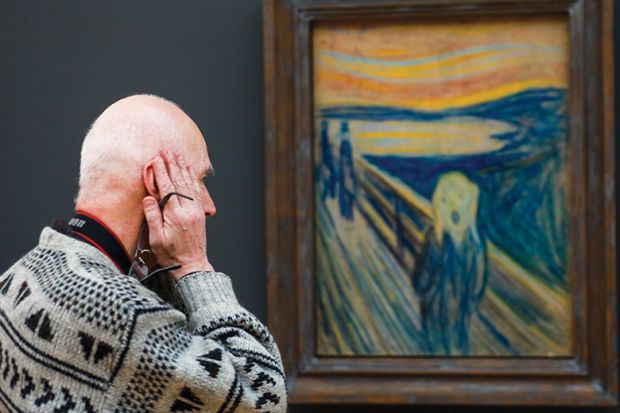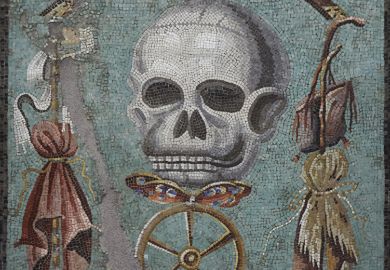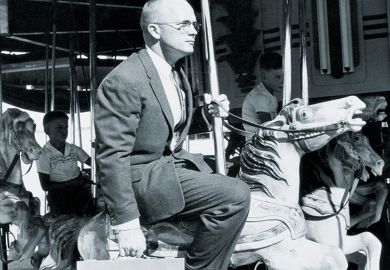The authors of Why We Are Restless are not afraid to pose a big question and then come up with an answer. Why, Benjamin Storey and Jenna Silber Storey ask, are so many of us unhappy and unfulfilled, and in remarkably similar ways? Their answer lies in “the mismatch between the kind of happiness we pursue and the kind of beings we are”.
They ascribe this mismatch to a modern way of thinking about the self that emerged in 16th-century France, in the work of Michel de Montaigne. They refine their thesis in a discussion of three French thinkers whose work was in dialogue with Montaigne’s: Blaise Pascal, Jean-Jacques Rousseau and Alexis de Tocqueville.
The classical and Christian tradition up to Montaigne, we read, agreed on the existence of “a single form of perfection that gives meaning and happiness to human existence”. It might be the Socratic search for beauty and wisdom in the “examined life”, or the Christian vision of human life as a pilgrimage, a voyage through this vale of tears, earth, on the way to our eternal home. Searching for this transcendent thing was arduous and painful but made human life worth living.
A new idea of the self arose during the European wars of religion of the 16th and 17th centuries. This offered people an idea of themselves that bypassed “the human tendency to deploy violence in the name of the sacred”. Against the bloody zealotry all around him, Montaigne celebrated a self pursuing “immanent contentment”. This self did not live up to any transcendent ideal. The human world was enough – a world not fallen, as the Christian story goes, but able to fulfil all our desires. We are selves, not souls.
Which reader of Montaigne’s essays is not won over by his humanity, sanguinity and sweet reason? His capacious, continually curious self contrasts so happily with that of his blinkered, Pharisaical peers. Montaigne sells us a new way of being: a life ordered around the search for inner equilibrium, fortified by rich relationships with others, the model being his own intense friendship with Etienne de La Boétie. Older social ties were bound by the external markers of law, blood and God; they merged the social with the sacred. For Montaigne, the social is unsanctified, a simple source of immanent contentment. If we tend it carefully, he promises, an unheroic, unholy and companionable life can satisfy all our longings.
Pascal tried and failed to demolish this new worldview. To be human, for Pascal, is to be haunted by an aching for a wholeness that mortal life cannot provide. Human beings will never be happy just to be human, because “man transcends man”. We are made for an anguished quest – the search for a distant God, who very occasionally dispenses the gift of grace that alone can fill the chasm in our hearts.
Yet Pascal could not rescue modernity from its godlessness. Rousseau sought a middle way, aiming to combine Montaignean immanence with Pascalian depth. We are unhappy, he thought, because human society has separated us from our true, natural selves. In Pascal, only God can redeem a fallen nature; in Rousseau, only nature can redeem fallen humanity.
Tocqueville’s account of American society suggests that Rousseau was just as unsuccessful as Pascal in rescuing modern, democratic humans from seeking happiness in themselves and each other. Tocqueville, the Storeys argue, is “the great political anthropologist of Montaignean modernity”. Travelling through America in the 1830s, he found a people demoralised by their relentless pursuit of happiness. These free, enlightened moderns were “grave and almost sad, even in their pleasures”. Tocqueville’s Democracy in America portrays citizens who are perpetually busy and on the make. They are defined by a love of material things, an impatience for change, and an inattention that he thought “the greatest vice of the democratic mind”.
This, the Storeys argue, is the vision of humanity we have inherited. We still, as Pascal wrote, can’t sit quietly in a room alone.
It seems a little unfair to blame our modern miseries on a single philosophical tradition. And surely Montaigne, who self-isolated in the tower of his chateau to read and think, can’t himself be accused of restless inattention and the inability to sit still in a room? The link this book makes between Montaigne’s philosophy and Tocqueville’s America is more metaphorical than genealogical – especially since, as the authors concede, Tocqueville only engaged with Montaigne via Pascal’s critique of him. There is more to Montaigne than his unmasking of pomposity, pretension and pointless social hierarchies, which the authors suggestively link to the American character and “our potent desire for affirmation as particular, irreplaceable persons”.
If you dislike the unreflective use of “we” and “our” to corral us together into some hypothetical modern self, then this book may start to grate, especially since it universalises the American experience. Personally, I found its refusal to damp down big points with constant caveats refreshing, especially since one of the effects is uncluttered prose. The argument feels schematic but essentially right. Its central notion of “immanent contentment” holds up well as a summary of the neurotic, self-defeating pursuit of happiness that many of us engage in.
A full and varied life, fruitful social connections, the approval and admiration of others: we seek these things not in search of some higher meaning but as ends in themselves. The downside is that we become pragmatists and opportunists in our relations with others. Social life powers itself on surface niceness and businesslike coldness. Democratic selves, the Storeys argue, need “to move on, to husband their wasting commodities of time and attention”. They are impatient for results – something tangible to show that they have made a mark. Never knowing what to expect from others in a social world forever in flux, modern selves “crave the reassurance of their fellows’ approbation, which proves to be as elusive as their whereabouts”.
As if unhappiness were not bad enough in itself, we have made it into an object of shame, covered up by our endlessly busy lives. This book’s prescription is that we need to think about our unhappiness more. We resist such hard thinking because of the fear of missing out on an exciting opportunity while we waste time on philosophy. We should attend more to “the strange and contradictory qualities that make us human – that we are free, rational, and open to the divine but also frail, fallible, and subject to death”.
The book begins with the story of a star student who comes to the authors for advice, anxious to the point of paralysis about which career to pursue. In trying to decide, she is using the self-maximising methods that her education has taught her: building up a CV, chasing countless opportunities socially and professionally, carefully weighing up all the career pluses and minuses. Her problem is that “the question of how to live cannot be answered by aggregating quantities”. An education centred only on immanent goods will not help us think through “the questions of our nature that yawn beneath our practical alternatives”. The proper role of universities, this book argues, is to offer “an education in the art of choosing”.
This case for a broad, non-instrumental, humane education is unapologetically earnest. It felt strange to read it as the post-Covid humanities face a crisis of recruitment, a round of redundancies and the open hostility of government. In that context, this call for universities to be “islands of patience in a culture of haste” feels brave and countercultural. But I fear that the people who need to hear it will be too busy and inattentive to read this book.
Joe Moran is a professor of English at Liverpool John Moores University.
Why We Are Restless: On the Modern Quest for Contentment
By Benjamin Storey and Jenna Silber Storey
Princeton University Press, 264pp, £22.00
ISBN 9780691211121
Published 18 May 2021
The authors
Benjamin Storey is the Jane Gage Hipp professor of politics and international affairs, and the director of the Tocqueville programme, at Furman University in South Carolina. He was born and raised in a suburb of Washington DC and did a first degree at the University of North Carolina at Chapel Hill. Jenna Silber Storey, assistant professor in politics and international affairs at Furman, grew up in Philadelphia and studied at Boston University. They both went on to the University of Chicago and met at the Committee on Social Thought, an interdisciplinary department where students “acquaint themselves with a select number of classic ancient and modern texts” before homing in on a particular dissertation topic.
It was there, they recall, that they “learned to read authors such as Montaigne and Pascal as if they might have something important to teach us. Students there spent countless hours joyfully arguing about divergent answers to the question of the good life. We’ve continued the conversations that began there in our marriage and with our students” – and now in Why We Are Restless.
Asked why they put such stress on a few thinkers, the Storeys respond that their “chief concern is to help students who, despite excelling at the various endeavours that define success in American colleges, find themselves unprepared to make the choices necessary to adult life. We trace their difficulties to the flawed ideal of the ‘balanced life’”, which has its origins in Montaigne’s thinking.
What students need to do instead, the Storeys continue, is to “approach liberal education as an education in the art of choosing…Pascal argues that human life, because it is mortal and finite, is necessarily a wager. We cannot avoid choosing to live our lives this way and not that way. If we were gods, dabbling our way to happiness might make sense, because we would have infinite time and no need to be serious. But we’re not.”
Matthew Reisz
POSTSCRIPT:
Print headline: A miserably modern malaise
Register to continue
Why register?
- Registration is free and only takes a moment
- Once registered, you can read 3 articles a month
- Sign up for our newsletter
Subscribe
Or subscribe for unlimited access to:
- Unlimited access to news, views, insights & reviews
- Digital editions
- Digital access to THE’s university and college rankings analysis
Already registered or a current subscriber?










